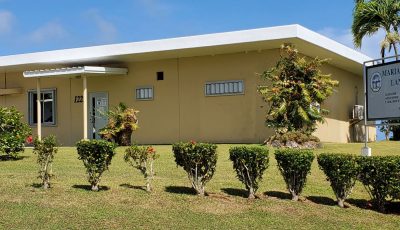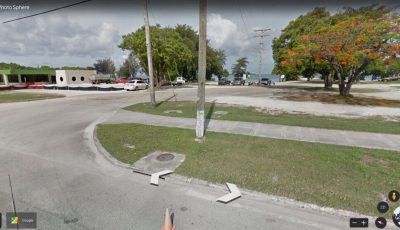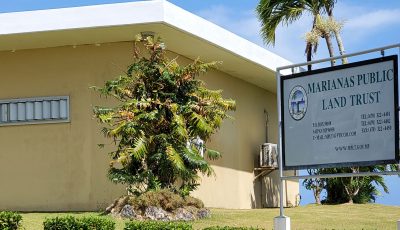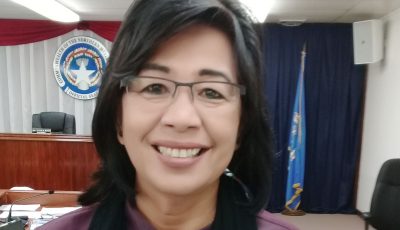MPLT questions authority of previous DPL admin’s grant of $500K for Garapan Revitalization Project
The Marianas Public Land Trust board of trustees has questioned the authority of the previous Department of Public Land administration for several actions, including granting the use of $500,000 for the Garapan Revitalization Project.
MPLT board chair Phillip Mendiola-Long said the DPL secretary has no authority to grant or divert public land lease revenue outside of its costs of administration, management, land surveying, and homestead development.
Mendiola-Long raised concerns over DPL’s grant of the use of DPL funds for the Garapan Revitalization Project in supporting House Bill 23-28, which clarifies the process for appropriation of DPL’s administrative expenses and the timely transfer of funds to MPLT.
Rep. Angelo A. Camacho (Ind-Saipan), who chairs the House of Representatives Natural Resources Committee, is the author of the legislation.
Camacho says there are ambiguities in the relationship between the responsibilities of DPL regarding the collection and expense of money related to public lands and the duty of MPLT to receive and invest public land money. To resolve this ambiguity, Camacho said his bill expressly places DPL within the normal budgeting process for an Executive Branch agency.
In the MPLT board’s written comments last April 24 to Camacho and House Ways and Means Committee chair Rep. Ralph N. Yumul (Ind-Saipan), Mendiola-Long pointed out that the DPL fiscal year 2020 report highlights that the then-DPL secretary granted the use of $500,000 for the Garapan Revitalization Project.
Mendiola-Long noted that the MPLT vs. MPLC case decision prohibits DPL from using revenue collected to “create infrastructure” such as roads, water lines or sewer lines. However, Mendiola-Long said, the DPL secretary narrows this court statement or restriction as confined to “public land designated within the homestead program” and not a capital improvement project in Garapan.
“What then was this ‘grant’ for the Garapan Revitalization project?” asked the chairman, adding that the DPL secretary has no authority to divert revenue in this manner and the two House committees should find this action a violation of the Constitution, Public Law 15-2, and the DPL secretary’s fiduciary duty as a trustee of public land lease funds.
Mendiola-Long said the same FY 2020 annual report states that DPL reported an accumulated debt from delinquent accounts of companies and individuals, which according to him presumably means leases and permits.
“This is disconcerting, given the amount outstanding,” he said.
Mendiola-Long said in the FY 2020 Annual Report, DPL has only billed $1 million in delinquent leases and permit charges and of this billing has only collected $500,000.
The chairman said there is no transparency nor disclosure as to who the delinquent lessees are, the amount each lessee or permittee owes and DPL’s action as to each delinquent lessee.
Mendiola-Long said MPLT maintains that the committees should request disclosure of this information as the import of this amount is clear—$12.4 million if collected would be available for investment to create interest income for the government’s general fund.
He said when the CNMI Supreme Court struck Public Law 16-31 as unconstitutionally infirm in taking public land lease funds from DPL for land compensation, the high court amplified and reaffirmed the role of MPLT to receive and invest public land lease funds for the benefit of persons of Northern Marianas descent.
Mendiola-Long said from the interest income earned, MPLT remits those funds to the Legislature, after reporting them, for appropriation.
The chairman said the MPLT trustees have provided the Legislature and administration with the funds from the interest income for appropriation.
He said MPLT has withheld no interest income other than for its costs of administration.
Mendiola-Long said those funds from interest income have paid for emergency power for the Commonwealth Utilities Corp.; for the Public School System; for the Commonwealth Healthcare Corp.; and, most recently, for Super Typhoon Yutu reimbursement in the amount of $15 million.
He said when DPL remits the entirety of funds, MPLT will be able to generate additional interest income for the Legislature to appropriate.
Mendiola-Long said the DPL bill achieves this by aligning DPL’s compliance with the Planning and Budgeting Act and remitting the net public land proceeds within 30 days of the end of each fiscal year.
Mendiola-Long said in its FY 2020 Annual Report, DPL informed the Legislature and governor that it “absorbed” 40 personnel from the Department of Public Lands and Natural Resources who now, as DPL employees, maintain public parks and beaches. Mendiola-Long said this is an example of what is impermissible activity by DPL in self-aggrandizing its operations.
He said the fundamental policies of DPL do not include maintaining public parks and beaches.
Mendiola-Long said the reported information suggests that DPL ran afoul of the Planning and Budgeting Act, doing an end-run around the Legislature’s appropriation power, among other violations.
He said in the same FY 2020 Annual Report, DPL informed the administration and Legislature that it collected $5.39 million in FY 2020—“mostly from leases and permit fees.”
The chairman said MPLT trustees read this to mean land lease income or revenue rather than security deposits or community benefits.
He said by simple application of the Constitution and the Planning and Budgeting Act, if the appropriation or budget for DPL as approved is $4 million, then $1.39 million would have been due to MPLT. Interestingly, Mendiola-Long said, this amount is close to the figure that MPLT had been demanding from DPL as due for remittance.
In response, DPL either ignores the entreaties by MPLT for remittance or it asserts that reconciliation is necessary through its FY 2020 audit, he said.
“MPLT respectfully disagrees,” said Mendiola-Long, explaining that the simple reason is that this is DPL’s reporting of income it “earned” per the DPL secretary’s report.
He said any excess income not budgeted is due for remittance to MPLT.
Further, Mendiola-Long said, then-DPL Secretary Marianne Concepcion-Teregeyo stated in her report that DPL certified over $2 million for land compensation payments. Later in the DPL report, the details of the payments are laid out.
However, Mendiola-Long said, what is not clear is that while DPL discloses the amounts and to whom the land compensation payments were paid, what is not disclosed is the source of the funds for compensation.
He pointed out that disclosure by the DPL secretary—a fiduciary of public lands—or the secretary of the Department of Finance to identify the funding source for land compensation is appropriate.
“So Mendiola-Long as funds for land compensation are not from public land lease funds, MPLT would not have any objection if this were the case. We should verify,” Mendiola-Long said.
In supporting the passage of the DPL bill, Mendiola-Long suggested further edits/revisions to the legislation and urged a detailed joint committee report that provides clear legislative intent and unequivocal legislative mandate for DPL to comply with the Planning and Budgeting Act as an Executive Branch department and no Mendiola-Longer a constitutionally created entity.




























